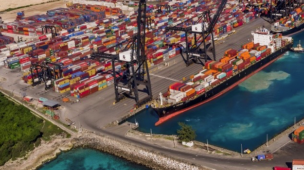Tempo de leitura: 3 minutos
Investors looking to set up their operations in SA are encouraged to consider our special economic zones (SEZ) which offer various incentives, reduced corporate tax rates, Custom Controlled Area (CCA) an employment tax incentive and state-of-the-art infrastructure.
Traditionally, economic activity had been concentrated in the three regional industrial hubs of Gauteng, eThekwini-Pietermaritzburg and the Cape Peninsula, which accounted for about 70% of the nation’s gross value add.
Importantly, the spread of economic opportunities is central to us building a more inclusive economy that benefits all South Africans. In establishing new industrial centres through our SEZs, the government is helping balance growth and industrial development.
These zones include the Coega and the East London industrial development zones (IDZ) in the Eastern Cape. Coega was designated in 2001 and is the largest IDZ in Southern Africa.
In KwaZulu-Natal we launched the Richards Bay IDZ and Dube TradePort as a catalyst for global trade in manufacturing and value-addition, primarily for the automotive sector, electronics and fashion.
Our tax-and duty-free incentives at the Saldanha Bay IDZ in the Western Cape serves as the primary oil, gas and marine repair engineering and logistics services complex in Africa. Atlantis SEZ, also in the Western Cape, has recently been designated by Cabinet to accelerate industrialisation in the West Coast region through the development and promotion of green technologies and related services.
The Maluti-a-Phofung SEZ in the Free State offers exporters a logistics base, while the Musina-Makhado SEZ in Limpopo is central to trade with neighbouring countries.
The OR Tambo IDZ in Gauteng will be developed in phases over a period of 10 to 15 years around the OR Tambo International Airport to help stimulate economic growth.
Our SEZs have become growth engines that stimulate regional economic activity and ultimately create much-needed jobs. They also help build thriving local communities, increase the ability of communities themselves to create jobs and foster a spirit of entrepreneurship that also stimulates employment creation.
Moreover, in revitalising local communities we are helping reduce the amount of labour and capital leaving our communities for cities. New areas of growth and development are created, helping spread economic activity in the country.
Vitally, our SEZs attract local and foreign investors who bring new technology and innovation that advances our nation’s industrialisation. Recent investments include Chinese company Yangtze Optics Cable which invested R150m in a modern, optical fibre cable manufacturing plant at Dube TradePort.
There are 34 investments worth R14bn in the pipeline at Saldahna Bay, while OR Tambo has attracted R260m in new investment covering horticulture and metal refining. These investments significantly contribute to our national goals of socio-economic development as they create sustainable jobs and the opportunity for skills development and training.
To build on our successes, the government has earmarked R4.9bn for industrial infrastructure projects over the next three years in SEZs and industrial hubs. In the coming year we will finalise two more zones for designation in Bojanala in the North West and Nkomazi in Mpumalanga.
Over the next three years, the private sector will be supported through our R18.8bn incentive programme. We anticipate a flood of interest given that last year the Department of Trade and Industry processed four applications and five claims a day.
Through our SEZs we are transforming our nation into a globally competitive industrial economy that creates employment and drives back the scourge of poverty. In the same breath we are ensuring all South Africans, no matter where they reside, share in the life-changing benefits of the economy so that together we can move our country forward.
The pursuit of jobs, better economic opportunities and a higher standard of living often force many families to uproot their lives as they look to move closer to one of the country’s main economic centres. While this legacy has been difficult to dismantle, through the SEZs, the government has reached a point where the economic potentials of our regions are being realised and more South Africans can actively participate in the mainstream economic activities, and access greater opportunities much closer to where they reside.






Os comentários foram encerrados, mas trackbacks e pingbacks estão abertos.